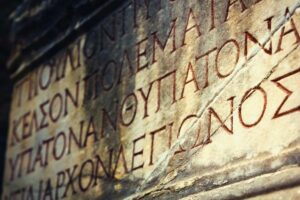In the early hours of October 28, 1940, a knock on the door of Ioannis Metaxas’s residence in Athens changed the course of modern Greek history.
The Italian ambassador, Emanuele Grazzi, delivered Benito Mussolini’s ultimatum — a demand that Greece allow Axis troops to occupy strategic positions on its soil. Metaxas’s reply was brief, resolute, and unforgettable: «Alors, c’est la guerre» — “Then it is war.”
He did not utter the word “No.” Yet, that single phrase carried within it the soul of resistance, the spirit of defiance, and the dignity of a free nation. Within hours, the people of Greece had given voice to his meaning — “ΟΧΙ!” — a cry that echoed through the mountains of Epirus and across the free world. It was not merely a word. It was a declaration that liberty is never surrendered.

Winston Churchill later said, “Hence we will not say that Greeks fight like heroes, but that heroes fight like Greeks.” That tribute captured the astonishment of nations who saw a small country stand up to fascism with courage far greater than its size. In an age when tyranny sought to subdue Europe, Greece became the first to deliver a resounding moral victory — a victory of spirit against force.
The Italian invasion that followed was met with fierce resistance. Poorly equipped but united in heart, Greek soldiers pushed the invaders back into Albania, defying every expectation. Women carried supplies through snow-covered mountains; villages became fortresses; and the cry of “ΟΧΙ” became a song of faith, sacrifice, and national unity.
The significance of October 28th extends far beyond that moment in 1940. It reminds us that the greatness of a nation lies not in its size or weapons, but in its moral courage. Greece’s defiance inspired occupied peoples across Europe — from France to Yugoslavia — showing that freedom can never be extinguished by force alone.

Even today, “ΟΧΙ Day” remains more than a remembrance of war. It is a celebration of collective dignity — of a people who refused to kneel before tyranny. It speaks to the eternal values of democracy, courage, and independence that define Hellenism from ancient Thermopylae to modern Europe.
Metaxas’s “Alors, c’est la guerre” was not spoken in anger, but with solemn clarity. It was the voice of a leader who knew that refusal meant sacrifice — yet also honour. The echo of that night continues to remind Greeks everywhere that freedom, once compromised, is lost forever.
As Greece commemorates this day, we honour not only the soldiers of 1940, but all who carry within them the spirit of resistance — the belief that truth and justice will prevail against fear and oppression.
From the mountains of Epirus to the islands of the Aegean, from the homeland to the diaspora, the message of October 28th still resounds:
Ζήτω το έθνος. Ζήτω η 28η Οκτωβρίου. Ζήτω η Ελλάδα.












